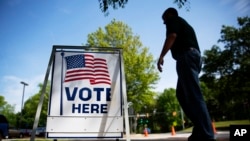Russia, China and Iran are likely to seize upon the attempted assassination of former President Donald Trump and the decision by current President Joe Biden to not seek reelection as part of ongoing influence operations aimed at impacting the upcoming U.S. presidential election.
The latest assessment from U.S. intelligence officials, shared Monday, comes less than 100 days until U.S. voters go to the polls on November 5, with all three U.S. adversaries already deep into campaigns seeking to sway voters and undermine confidence in the democratic process.
“These actors are closely monitoring U.S. political developments, especially the events that occurred this month regarding the presidential race,” a U.S. intelligence official told reporters, briefing on the condition of anonymity in order to discuss sensitive findings.
“We expect these actors to adjust to these events and incorporate them into their influence narratives,” the official added.
U.S. intelligence officials said it is too early to be able to point to specific examples of how the three U.S. adversaries are making use of the attempted assassination or of Biden’s decision to drop out of the presidential race and endorse Vice President Kamala Harris.
But they said while specific tactics used by the U.S. adversaries are expected to change, the overall strategies and preferences remain constant.
A U.S. intelligence assessment shared earlier this month indicated that just like in 2016 and in 2020, Russian influence efforts were focused on support for the candidacy of Trump.
The intelligence assessment issued Monday confirmed that remains the case.
"Russia's core interest in this election is opposing candidates who want to offer aid to Kyiv," the intelligence official said. “We expect Russia’s focus will remain on that.”
Officials said, as with their earlier assessment, that China remains cautious, seeing little benefit from the election of any of the major party candidates.
Iran, however, has decided to take sides, using its influence campaign to hurt the Trump campaign.
“Iran's preference is essentially a reflection of its desire to not worsen tensions with the United States,” the intelligence official told reporters. “Iran is opposing the candidate that Tehran's leaders perceive would increase those tensions.”
The Trump campaign has previously rejected U.S. intelligence assertions that Moscow is seeking to boost the former president’s election chances, pointing to public comments by Russian President Vladimir Putin praising Biden.
“When President Trump was in the Oval Office, Russia and all of America's adversaries were deterred, because they feared how the United States would respond,” national press secretary for the Trump campaign, Karoline Leavitt, told VOA in an email.
Russia and Iran have also denied past allegations of election meddling, while Chinese officials have said Beijing has “no intention” of interfering.
But U.S. intelligence officials Monday pushed back against Russian, Iranian and Chinese denials.
The number of instances of influence efforts or interference threats flagged for further review “thus far has more than doubled from prior [election] cycles,” said a second U.S. intelligence official.
Part of the reason, the second official said, is that presidential elections tend to get more attention than so-called midterm elections. But even so, the number of worrisome influence efforts is expected to increase further in the coming weeks and months.
“We also anticipate that we probably will see even greater focus from our adversaries even as we get closer to the election,” the official said.
U.S. officials likewise expressed concern that Russia, China and Iran are working harder to obscure their influence operations and “better hide their hand.”
Russia and China, in particular, are turning to marketing and public relations companies to refine and distribute their narratives to Americans, who may think that the messages are coming from other, real U.S. voters.
“These firms essentially offer election influence in a box,” said the first intelligence official. “In addition, they are more nimble and have fewer bureaucratic hurdles.”
The intelligence officials said Russia tends to use Russian companies while China has turned mostly to domestic Chinese firms. But they noted a growing number of private companies are offering such services, including outfits in the Middle East and Latin America.
“This is something that is increasingly a concern of ours, given how active they are both in the United States but also overseas in other elections and other democracies,” the intelligence official said.
The use of third-party companies, though, still accounts for just a small fraction of the overall influence operations, some of which are being run by intelligence agencies in Russia and Iran, which have also sought to use Americans in more direct ways.
“Foreign actors continue to rely on witting and unwitting Americans to seed, promote, and add credibility to narratives that serve the foreign actors’ interests,” according to the assessment released Monday.
For Moscow, the tactic is not new, though officials said there are indications the Kremlin’s efforts have intensified.
There is likewise growing concern about Iranian overtures to Americans, given ongoing outreach by Tehran to U.S. persons protesting U.S. support for Israel in Israel’s war against the Hamas terror group.
Russia, China and Iran are not alone in their efforts to influence the upcoming U.S. presidential election.
Officials Monday said Cuba has launched what they described as “localized influence operations” aimed at undercutting political candidates opposed to Cuba’s communist government.
Officials said other countries are also running influence operations aimed at the election and that though the scope and scale varies, they all pale in comparison to the ongoing campaigns from Russia, China and Iran.






